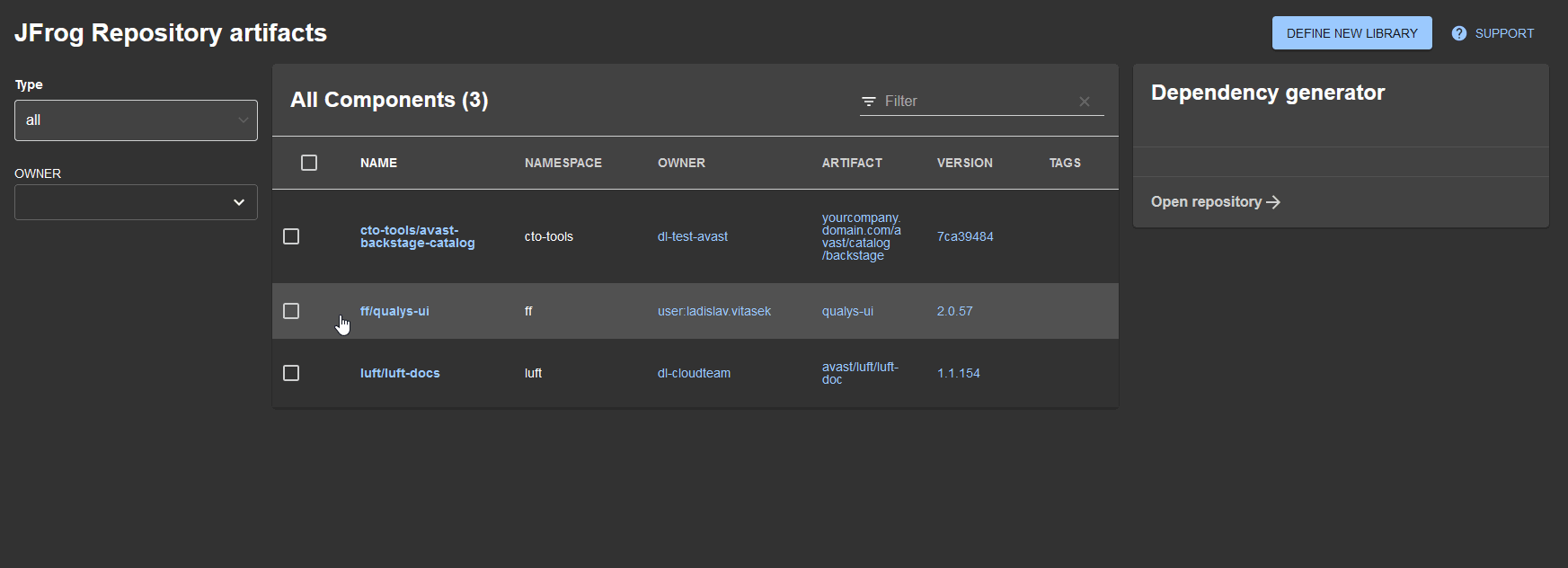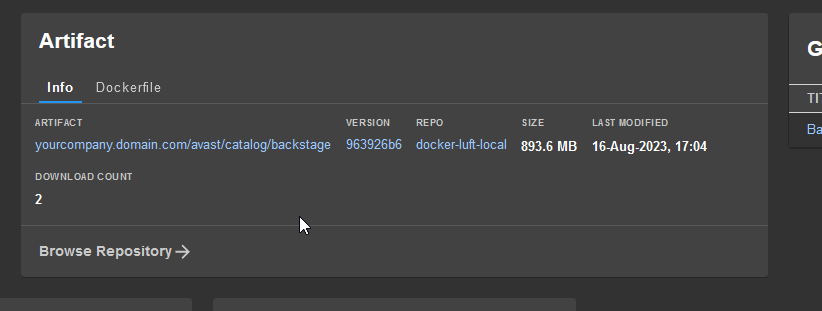backstage-plugin-jfrog-artifactory-libs v1.0.11
Backstage JFrog artifactory libraries plugin
The Backstage jfrog-artifactory-libs frontend plugin provides a simple way to display generated artifact (library)
details like - group, artifact, repository, what is the latest version, and it simply allows to copy library definition
for the package managers.
Nowadays, the plugin supports these package managers types in JFrog: Maven, Gradle, Sbt, Pypi, Docker.

Installation
To install the plugin, you'll need to add it to your Backstage app's dependencies using either Yarn or NPM.
Yarn
yarn add --cwd packages/app backstage-plugin-jfrog-artifactory-libsIntegration
Once you've installed the plugin, you'll need to integrate it into your Backstage app. To do so, you'll need to following code into your BS instance:
JFrogLibArtifactCard
Add the JFrogLibArtifactCard component to the EntityPage.tsx in your app:
import {JFrogLibArtifactCard, isJfrogArtifactAvailable} from 'backstage-plugin-jfrog-artifactory-libs';
//....
const overviewContent = (
// ...
<EntitySwitch>
//...
<EntitySwitch.Case if={isJfrogArtifactAvailable}>
<Grid item md={4}>
<JFrogLibArtifactCard/>
</Grid>
</EntitySwitch.Case>
//...
</EntitySwitch>
// ...
);JFrogLibVerPage
If you want to browse libraries you can enable this component in your App.tsx file. It shows all component entities containing jfrog.com/artifactory-artifact attribute.

const routes = (
<FlatRoutes>
//....
<Route path="/libver" element={<JFrogLibVerPage topComponents={<DefineNewLibraryButton />} />}>
</Route>
//....
</FlatRoutes>
);Explore page - JFrogLibVerPageContent
This is a subcomponent of JFrogLibVerPage component. It's possible to integrate it for instance into your Explore page.
import { JFrogLibVerPageContent } from 'backstage-plugin-jfrog-artifactory-libs';
//....
<ExploreLayout
title={`Explore the ${organizationName} ecosystem`}
subtitle="Discover solutions available in your ecosystem"
>
// ...
<ExploreLayout.Route path="libver" title="Libraries">
<JFrogLibVerPageContent />
/>
</ExploreLayout.Route>
// ...
</ExploreLayout>
// ...
);App-config.yaml
Set up a proxy for the JFrog API by adding the following configuration to your app-config.yaml file:
'/artifactory-proxy/':
target: 'https://your-jfrog-artifactory-instance.com'
headers:
# if you use Jfrog instance for anonymous user token is not required, but it is also required for Docker package type
Authorization: Bearer ${ARTIFACTORY_TOKEN}
X-Result-Detail: 'properties'
Accept: '*'You have to also reference your artifactory URL (used for UI browse links) and your proxy configuration.
jfrog:
artifactory:
url: 'https://your-jfrog-artifactory-instance.com'
proxyPath: '/artifactory-proxy/' # optional, /artifactory-proxy/ is default value Catalog-info.yaml
Artifact details are correlated to Backstage entities using an annotation added in the entity's catalog-info.yaml file.
metadata:
annotations:
# -- required values --
jfrog.com/artifactory-artifact: 'artifact-name'
jfrog.com/artifactory-repo: 'maven-local'
jfrog.com/artifactory-group: 'com.mycompany' # optional string - can be blank for pypi, necessary for Maven repos
# -- optional values --
jfrog.com/artifactory-scope: 'compile' # optional string, one of these [compile, test,provided,runtime,classpath,optional]
jfrog.com/artifactory-packaging: 'aar' #optional string, eg. `aar` And that's it! The plugin should now be integrated into your Backstage app, and you should see the Artifact card when you navigate to the entity page where it's included.
For a docker image you define repository and artifact name. Both formats are supported:
metadata:
annotations:
# -- required values --
jfrog.com/artifactory-artifact: 'docker.mydomain.com/mygroup/my/artifact-name' # or simply 'mygroup/my/artifact-name'
jfrog.com/artifactory-repo: 'docker-local'
Configuration
JFrogLibArtifactCard has following default properties:
LibArtifactCard.defaultProps = {
title: 'Artifact', // title of the card
browseRepositoryLinkTitle: 'Browse Repository', // Card deep link title
showGradle: true, // whether to show Gradle package manager tab
showMaven: true, // whether to show Maven package manager tab
showSbt: true, // whether to show Sbt package manager tab
showPip: true, // whether to show Pip package manager tab
showDockerfile: true, // whether to show Dockerfile tab
// it hides Maven and Gradle tabs if the current repository package type is `PyPi`
autohideTabs: true,
showBrowseRepositoryLink: true // whether to show Browse to URL deep link under bottom of the Card
// which link to open
browseLink: browseLinkDefault,
};Support for scaffolding
In this document you can find detailed information how to integrate this plugin into scaffolding templates.
It also adds a new extension UI component called ArtifactRepositoryPicker for interactive repository selection.
How it works
Plugin uses JFrog APIs to find latest version. It's necessary to specify ARTIFACTORY_TOKEN in the app-config.yaml
file if you don't allow to access API for anonymous user.
Changes
Version 1.0.9
- JFrogLibVerPageContent and JFrogLibVerPage components added
- (!) renamed LibArtifactCard into JFrogLibArtifactCard
Contributing
Don't hesitate to contribute to the plugin. This is my first TypeScript/React/Backstage product so please be gentle to me...
Development
Copy plugin content into your plugins directory, and add a dependency into app/package.json as described above.
Future plans
- More tests
- More package managers support
- Multiple artifacts defined in one entity
- Multiple artifactories instances?
License
This plugin is licensed under the Apache 2.0 License.